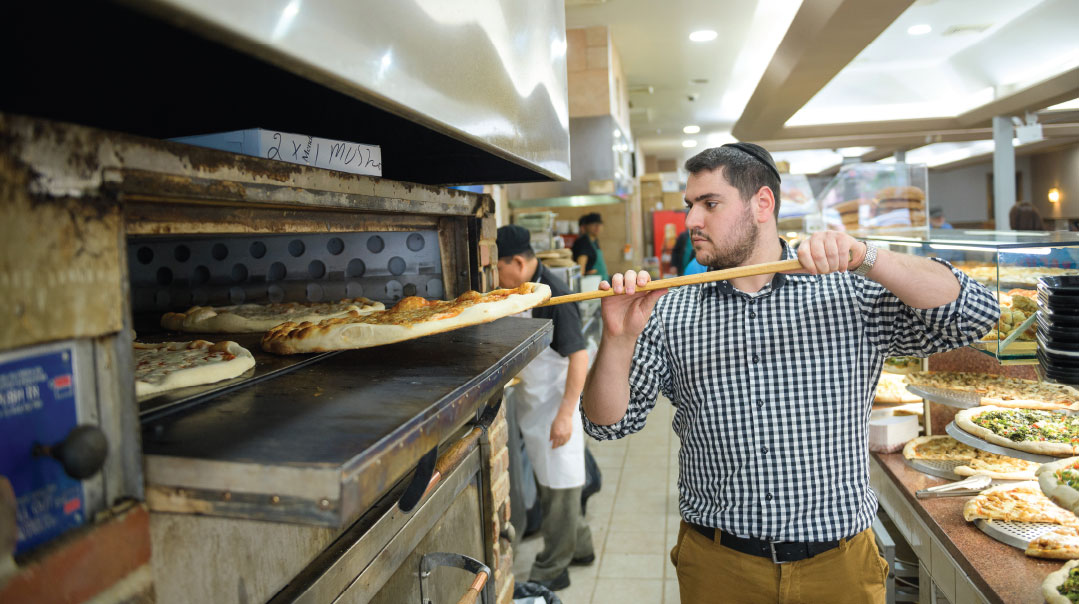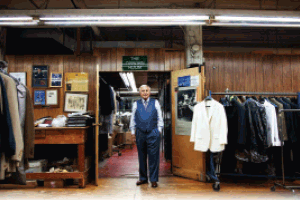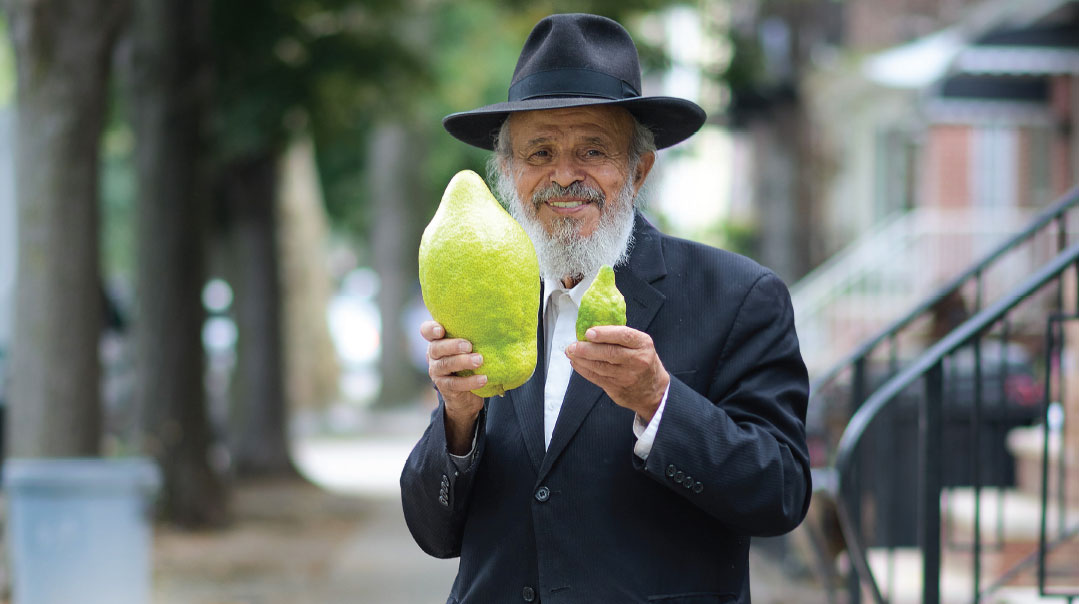Bread, Milk, and Belonging

We looked around the Jewish world and found some beloved mom-and-pop shops that are still holding their own
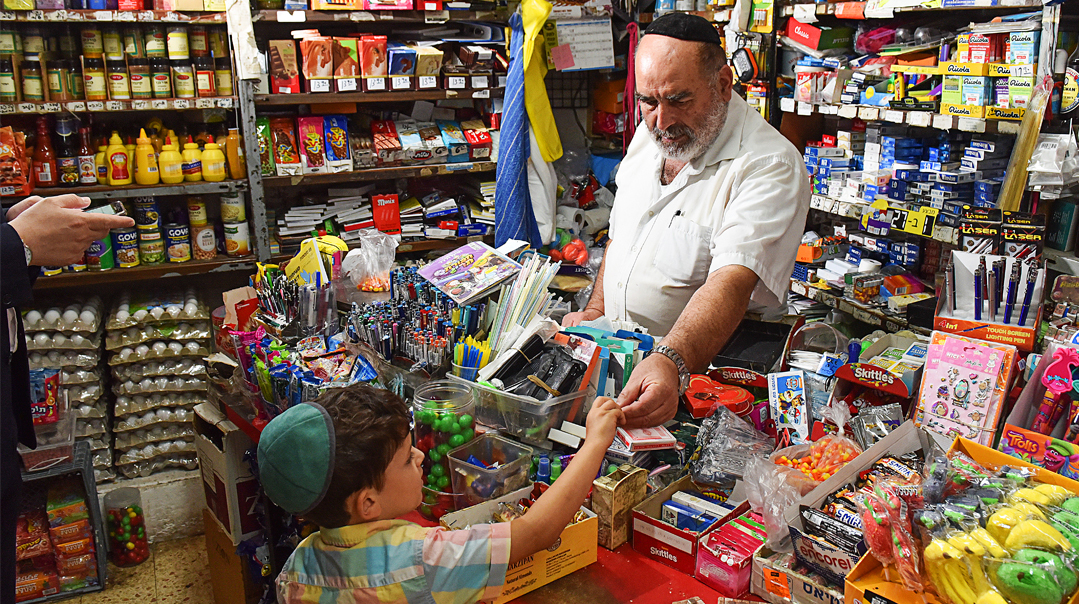
Project Coordinator: Gedalia Guttentag
Sanhedria
Small Store, Big Heart — Yechezkel’s Makolet Est. 1977
By Gedalia Guttentag | Photos: Pinchas Emanuel
"Everybody loves Yechezkel — he’s a fixture of your life,” says a distinguished-looking Yerushalmi customer paying for his morning bread and cottage cheese.
“Tell you about Yechezkel?” asks a young chassidic man with a mischievous grin. “All you need to say is Yechezkel — that says everything.”
It’s Tuesday morning, and the customers who’ve made their way into the cave-like entrance of Yechezkel’s makolet in Jerusalem’s Sanhedria neighborhood immediately notice something unusual.
This little superstore-in-a-box has stood virtually unchanged for more than four decades. Rows of dusty wine bottles rub shoulders with shampoo, and boxes of half-a-shekel candies beckon children at eye level, as they called out to their parents a generation ago. But in all 43 years of his reign, no cameraman has ever disturbed the orderly chaos that is Yechezkel Daliah’s makolet, and the customers are eager to share their thoughts about the man behind the desk.
In a world of soulless supermarkets, gleaming stores with sushi counters and wine-tastings, one small makolet holds out against the tide of so-called progress. Spurning the relentless rise of silicon, Yechezkel manages cash flow on rolls of paper, Rolodex cards, and brain power. Crusty yet kindly, he’s already onto his third generation of customers.
Part grocery store, part social hub, part chesed empire, the best way to define this place and its owner is in the pithy words of a shopper on the run. “Yechezkel? He’s family.”
If Sanhedria’s makolet had any sign, it would read “Yechezkel’s — memorial to a bygone era of shopping.”
Start with the incredible counter. Candy corn, envelopes, and chocolate bars are crowded out by a box of earphones, which in turn are overshadowed by packs of stickers that threaten to topple ranks of pens. Once upon a time there was a pickle barrel, a la Lower East Side. That’s gone, replaced by the latest candy machine from China.
On the shelves around the counter, gefilte fish and deodorant jostle with eggs. Laser pens dangle next to batteries and cigarettes, and pre-checked cholent beans go head-to-head with Mike & Ikes. All that plus a pair of scales, an electric till, and Yechezkel’s breakfast.
The range of products in this cramped store is enormous. What’s more, the owner has no idea how many there are — even to the nearest couple of hundred. The only hint of modernity is the suppliers, who now place his orders from a tablet, instead of Yechezkel selecting what he wanted from the back of a truck.
But apart from the pre-modern clutter, what makes this place nostalgic are the customers, and their personal relationships with him. “When I first took over the makolet from Adon Cohen in 1977,” says Yechezkel, “the neighborhood was 80 percent Holocaust survivors, from Hungary and Poland. But now it’s changed — there are a lot of young couples, avreichim from America and Israel.” In today’s Sanhedria, salt-of-the-earth Yerushalmis, foreign kollel couples, Ashkenazim and Sephardim rub shoulders — and Yechezkel knows them all.
That has a lot to with the nature of the neighborhood, which is essentially a few streets nestled behind the busy Bar Ilan interchange. In a small section of this old Jerusalem neighborhood, built in the early 1930s, there’s a butcher, grocer, fruit and vegetable store, and fishmonger plus shuls, kindergartens, and parks. In fact, there’s almost everything that you need until 120 — and beyond, if you count the beis olam next door. It all lends the neighborhood a shtetl-like quality, and Yechezkel interacts with his customers like a village grocer of yore.
Someone calls out as he’s about to exit, “Yechezkel — two leben and one bread,” and this is swiftly added to the family bill on a long roll of paper. Next comes a customer who wants to buy a single cigarette and puts down a shekel. Then the phone rings: “Do you have brown bread?” asks the voice over the line. “Where else does the shopkeeper answer the phone?” demands another customer.
This may be a store, but many people come to catch up with the news as well. Standing in line, shoppers browse the morning papers — which they have no intention of buying — and discuss the latest events. As the radio drones in the background, Yechezkel shakes his head over the conundrum of American politics.
“Why did they elect Obama?” he exclaims.
As village patriarch, Yechezkel knows many of the children by sight. “I have customers whose mothers sat on this desk,” he says, rapping on the faded red Formica. “Now they bring their own children as well.”
Adding up a bill for a small child, the dialogue goes something like this: “Yeled, stand here!” (He motions to a particular spot behind the counter.) “What do you have?”
“One milk.”
“Mah od?”
“One bread.”
“Okay, mah od?”
“Nothing.”
“Yeled, go home!”
While Yechezkel continues serving customers wanting salt, bread and other small items, someone else describes what creates that special family feeling: “Where else does the owner tell you, ‘You don’t need this — your wife already took one home’?”
Until his petirah in 2013, legendary Eidah Hachareidis posek and official neighborhood rabbi Rav Yaakov Blau was probably Yechezkel’s most famous customer. As Yechezkel is himself a proud descendant of Baghdadi Chacham Rav Abdallah Somach (teacher of the Ben Ish Chai), the two made an unlikely pair. But selling chometz led to a long-standing relationship that Yechezkel treasured.
“We did a proper mechirah with the Arab worker from the next-door Hacker’s butcher, who kept the key,” he says. “And after Pesach, the Rav only wanted to buy my chometz.”
As a leading authority on business and monetary halachah, Rav Blau would often stand by Yechezkel when customers refused to pay. “There was one institution in the area that ran up a very large bill for six months and avoided settling their debt,” Yechezkel recalls. “I went to Rav Blau, and he pressed them to pay. Finally, after nearly a year, they came to pay half on Erev Yom Kippur. I said to them, ‘Go and apologize to the Rav for causing him trouble.’ Rav Blau told them: ‘Go and apologize to Yechezkel.’ ”
But it was together with Rav Blau that Yechezkel turned his small store into a chesed empire. “Rav Blau ran the local tzedakah fund,” he explains. “He would send people to me who would do all their shopping on credit, and then Rav Blau would settle their debts.”
Whether or not the arrangement continues with the current heads of the tzedakah fund, Yechezkel hasn’t given up the practice of writing off debts. “I saw a woman here who comes from a totally poverty-stricken family,” a local resident tells me. “She filled up her shopping bags with food and snacks and put it on the bill. Yechezkel made a note of it all, and when she’d left, I saw him throw the bill into the garbage.”
Yechezkel himself wouldn’t tell me that story, but with the shop now empty, he opens an envelope that tells a heart-tugging story. Inside is a collection of small notes, some in juvenile handwriting, some written by people far older. “Often before Rosh Hashanah I receive a note like this,” he says. “Thirty years ago I lived here as a young girl,” it reads, “and I would sometimes come and take an ice pop or chocolate. All of these years I’ve wanted to apologize, but now I’ve had the chance to come to Yerushalayim to pay my debt. Here is 100 shekel, and please say out loud “I forgive Leah bat ___.”
As he puts away his “mechilah envelope,” Yechezkel says, “There are many like this. I recently had a 20-year-old girl who called on her wedding day and apologized for stealing seven years before. Back then, her father had come over and shouted that I was accusing his daughter, and humiliated me here. Then it turned out that she was getting married to a boy in my beit knesset — and as the gabbai I had to call him up. But that’s when she asked — ‘Please say out loud, I forgive you,’ so of course I did.”
Dispensing leben along with life-wisdom to Yerushalmi old-timers and American newlyweds, Yechezkel is a vanishing breed of shopkeeper.
As children grow up, he keeps track of them, and a shopper absent too long from the post-Shacharis grocery run will occasion a concerned “How is the rav?” to his wife coming later in the day. To anyone reappearing in the makolet after an absence, he cloaks his warm feelings in an abrupt “Nu — eifoh atah?”
The pickle barrels no longer cast their pungent smell over the shoppers, but Yechezkel is still there, serving up cottage cheese and kindness to a new generation.
(Originally featured in Mishpacha, Issue 781)
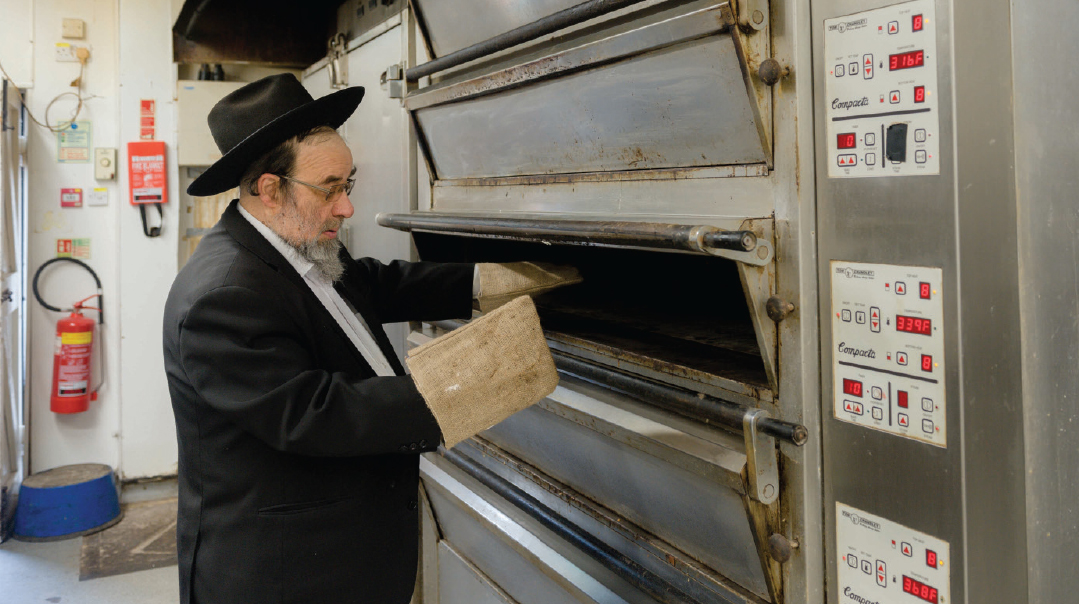
Gateshead
Come Rain or Shine — Stenhouse Est. 1940
By Yoni Klajn | Photos: Ruskin Photograhy
The shtetlach of prewar Europe, with their distinct character and charm, may have long been consigned to the annals of history, but in the northeast of England, Gateshead might be the last remaining vestige of that model.
Home to close to 600 families as well as numerous yeshivos and two seminaries, it is devoid of the trappings of typical Jewish communities. Restaurants? You’re in the wrong place. A gourmet kosher shopping experience? Try London. This is a town where the mesorah is staunchly upheld and the legacy and vision of its founding fathers live on, strong as ever. They were unyielding firebrands, people who put their Yiddishkeit first and material comforts an unquestioning second.
And, nestled at the heart of this small but vibrant hamlet, sits the original grocery shop and bakery, Stenhouse. If you’re on the hunt for an old-time grocery store with a story to tell, you’ve hit the jackpot.
That small-town feeling hits you the minute you cross the threshold of this store. Sitting behind the checkout across the aisle from where boxes of tuna cans are piled high alongside cartons of mayonnaise, a short man with a graying, bushy beard and hat firmly fixed on his head taps away at the screen as he processes an order. This is the proprietor of 30-plus years, Mr. Rabinowitz, known simply as Tully by young and old alike.
A Gateshead veteran, Tully is a man whose kevius ittim l’Torah is sacrosanct and whose avodas hatefillah is suffused with sincerity and good old Yiddishe taam.
That sincerity and sense of purpose extends itself to the way the Rabinowitzes run the business too. A choleh’s family will find a delivery of bags bursting with food on their doorstep, gratis; elderly patrons with limited mobility get their choice of weekend newspapers delivered to their door on Erev Shabbos, their Shabbos reading taken care of by the proprietors. And although the shop has modernized and expanded over the years, it has never been at the expense of its old-time charm and personal touch.
Listening to the exchanges going on at the checkout is an insight into all that’s happening in town. The son-in-law who’s just gained a new shteller (“He’s put on a frock, did you know?”), the elderly man from around the corner who, nebach, suffered a fall, the increased price of a tray of eggs — they’re all fair game for animated conversation. Anyone who’s lived here more than a few weeks can expect to be addressed by name. In this shop, everyone’s family.
Given its location at the end of the UK’s kosher food supply chain, availability of some products is often low and, when a sought-after item finally arrives, can get sold out quickly. Still, if you’re friendly with the right people, they’ll sort it for you. One of the cashiers runs a covert hoarding operation whereby a variety of food items gets stashed behind the till, put away for the customers she knows will want them before they sell out. A bag of checked lettuce, a popular kid’s magazine, and a brand of kuchen from London all stay well out of sight, waiting to be claimed by their faithful buyers.
It’s 1962. As dawn rises on a new day in the industrial, coal-rich northeast of England, the lights have been burning strong throughout the night at the Stenhouse bakery. Proprietor Feivy Stenhaus has been hard at work to ensure a fresh bread supply for the people of Gateshead, then a community of a mere 70 families. Alongside him is his young apprentice Gershon Fordsham, later the housemaster at the Gateshead Jewish Boarding School, long-time rebbi and leader of its choir.
The clock strikes 6 a.m. and the shrill noise of the telephone interrupts the steady pace of work. Then, as suddenly as it began ringing, it stops.
Reb Feivy stops, hangs up his apron, dusts himself down, and heads for the door. His chavrusa, the famed mashgiach of Gateshead Yeshiva, Rav Moshe Schwab, awaits. The Gateshead baker has started his day — the Torah way.
Reb Feivy was no grocery shop owner by his self-definition. The shop was a mere supporting act in the life of a man who lived and breathed Torah. It was an enterprise in which the opening hours revolved around Reb Feivy’s sedorim, not the other way round. In fact, he was so highly regarded as a talmid chacham that when the previous Gateshead Rav, Rav Betzalel Rakow ztz”l was away overseeing the town’s matzah production, Reb Feivy was the one nominated to deliver the daily shiur to the balabatim. It became a longstanding town joke: When the rav becomes the baker, the baker becomes the rav.
Feivy Stenhaus’s commitment to limud Torah was matched only by his uncompromising honesty and yashrus. Gershon Fordsham recalls his boss requesting that he count up a batch of buns.
“Are there six dozen there?” asked the German-born Yekkeh.
“I think so,” replied the young recruit.
“Well, you’d better count them again then. There’s no such thing as ‘I think so’ — either there’s six dozen there or there isn’t,” said Reb Feivy, teaching the teen a valuable lesson for life in exactness and truth.
Arriving on British shores with his family as a German refugee, young Feivy had been a star talmid of the Seridei Eish, Rav Yechiel Yaakov Weinberg of the Hildesheimer Rabbinical Seminary in Berlin, and his planned trajectory was a life of learning and rabbanus. Escaping Europe and arriving on British shores, the family found themselves in Gateshead, then a tiny settlement of frum families. At that time, pas palter was standard fare and opening a kosher bakery was a logical step in their efforts to earn a living.
While Rav Eliyahu Dessler’s name will forever be associated with the Gateshead Kollel and Gateshead Sem, what is little known is his role in establishing the Stenhaus bakery. Since the family did not have the funds to get their business off the ground, Rav Dessler lent them the seed money to get them going.
Reb Feivy steered the shop through the austerity of World War II and subsequently saw it flourish with three branches operating across the region. After years of running the business and building a sterling reputation for himself, the legendary baker retired, becoming a kollel yungerman again, ensconced with his cherished chavrusas all day long.
When, a little over 30 years ago, the outfit was bought from the Stenhaus family by the Rabinowitzes, the business changed hands, but the iconic name and distinctive character remained.
Considering that Gateshead has but two grocery shops — separated from each other by a walk of about 20 seconds — one could safely surmise that almost every week Stenhouse will have most of the town’s residents crossing its threshold. It’s Gateshead’s very own version of Piccadilly Circus. From school boys to yeshivah bochurim, young marrieds to experienced housewives, kollel yungeleit to businessmen to maggidei shiur, they all pass through Stenhouse at some point. After all, it’s the only place in town to buy fresh bread.
Not expansive by any means, the shop makes up in heart what it lacks in floor space. Numerous strollers are parked at the entrance and residents of all ages and stages shop, chat, and exchange news, mazel tovs, and the latest shidduchim.
The wall adjacent to the two checkouts is a veritable smorgasbord of communal life, festooned with notices of all shapes and sizes. This is information central, a cluttered panoply of flyers and adverts where any news worth knowing is posted. Whether it’s the weekly ladies Shabbos shiur announcement, an apartment for rent, or an ad emblazoned “Beds for Sale,” this humble wall carries it all.
A young boy enters on his scooter and casually props it against the wall. “Out with that, young man!” comes the command from behind the till as Tully’s son, store manager Yanki, keeps a watchful eye on the goings-on in the busy store. “No room for those in here and we don’t want anyone hurting themselves. Thank you!” As he scans products and deftly keeps the queue moving along, Yanki shares his perspective on the role his family plays in this one-of-a-kind kehillah. “We’re here to serve the community,” he says, scanning a bottle of milk. “Come rain or shine, Stenhouse will always be here. We’ve been around too long to go under.”
Tully remembers one Erev Shabbos years back, when he about to close up. To his horror, he saw a baby carriage over in the corner, its precious cargo sleeping blissfully, the young baby’s mother nowhere to be seen. What to do? Mrs. Rabinowitz began walking the streets of the tight-knit neighborhood pushing the carriage, asking the kids playing outdoors if they recognized the infant. Sure enough, the baby was quickly identified and returned to its much-relieved mother.
Not only does the shop service the families of the kehillah, it also supplies the yeshivos and seminaries with their bakery requirements. One Stenhouse specialty is its “Wednesday buns,” a once-a-week treat much loved and revered by die-hard Gatesheaders the world over. A sticky bun laden with icing and chocolate, it’s the nosh of choice among discerning school boys who rush in post-Shacharis to pick up the coveted delicacy.
Sent on a shopping trip by my wife one recent evening, a loaf of bread topped the list. Discovering that the shelves were empty — and oh-so-fearful of the reprisal should I return home empty-handed — I ventured through the door at the rear of the shop and into the bakery’s production area. There I bumped into the non-Jewish baker starting his night shift and behind him, trolleys full of steaming fresh loaves ready to be sliced.
“Can I take a loaf, please?”
“Naa, yer cannat,” came the reply in the thick Geordie vernacular, often an incomprehensible garble to the untrained ear. I wasn’t prepared for what came next: “Tully’s yet to take halla,” explained the baker plainly.
In these parts where tradition reigns supreme, even the non-Jews are ensuring the halachah is kept just as it should be.
(Originally featured in Mishpacha, Issue 781)

Antwerp
Minding the Store — Hershkovitz-Katz Est. 1981
By David Damen | Photos: Daniel Benjamin Photography
Reb Yechiel Hershkovitz, clad in his blue overalls, still personally arranges products on the shelves, checks price tags, supervises lines at the cash registers, and does everything to make his supermarket operate with maximal efficiency.
Despite the massive size of his store, with its tens of thousands of products and seemingly endless lines of shelves, Reb Yechiel operates as if he were still running the tiny makolet he opened 38 years ago. He still maintains the homey atmosphere and personal relationship with customers that characterize a small communal grocery store. He knows each of his customers, knows when to extend a mazel tov and when, chalilah, to offer condolences, and also when a customer’s financial situation isn’t very good.
Hershkovitz, a Belzer chassid, grew up in Rehovot, but moved to Antwerp after his marriage to Miriam (née Katz). When he decided to leave kollel and enter the workforce, he considered trying his hand in the diamond industry, but it was already showing signs of decline. That’s when he got the idea to open a makolet.
His father, Rav Pinchas Zelig a”h, was a bit nervous about that idea, and went into the Belzer Rebbe for advice. “The diamond industry is not for your son,” the Rebbe told him. “He’ll have parnassah from a different source. Each person is born with his bread in his hands.”
Reb Yechiel took that answer to its literal level. Now he sells bread (and other baked goods from the Kleinblatt bakery), literally walking around “with his bread in his hands.”
When his plans were actually getting underway, he went to the Rebbe for his own personal brachah. The Rebbe surprised him with a question: “Yechiel, what time will you close your store on Erev Shabbos in the summer?”
“Rebbe,” Yechiel answered, “I haven’t opened the store yet.”
“If you’ll take it on yourself to close early every Erev Shabbos, you’ll see success,” the Rebbe said. “In Antwerp you hardly feel that it’s Erev Shabbos on Fridays.”
The Rebbe was right. In those years, when the diamond industry was at its peak, people would put in nearly a normal workday on Fridays, especially in the summer.
“From the day I opened the store,” Reb Yechiel avers, “I’ve been scrupulous about closing early, even during summer when Shabbos comes in very late. I could have customers here until shkiah. But you know what? Thanks to this, some other Jewish stores in Antwerp began doing the same thing.”
The Rebbe’s brachah for success, it seemed, was being fulfilled from day one. Hershkovitz’s small convenience store, which at first covered only 40 square meters, has expanded tenfold. Today it covers 400 square meters, and its shelves are filled with tens of thousands of products from all over the world.
Until today, Yechiel won’t take a step in the business without the Belzer Rebbe’s input. Every special investment, every new development and expansion, is done with the Rebbe’s advice. After his last expansion, Rav Aharon Mordechai, the Rebbe’s son, put up the new mezuzahs.
“When the store opened,” Reb Yechiel remembers, “it was a real chiddush — an Israeli-style, bread-and-milk makolet. Until then, the way Antwerp worked was that there were dairy enterprises and bakeries, but everything was separate. Here we even sell different types of cheeses by weight.”
“Our ‘makolet,’ if you can still call it that,” says Reb Yitzchak Aryeh Bleichfeld, Reb Yechiel’s son-in-law and partner in the store, “is really cosmopolitan. Israeli grocery products like Osem, Elite, and Bnei Darom sit on the same shelf with mehadrin American products like Mishpacha, Gefen, and Leibers. And in between are the English and Belgian companies such as Rumplers and Elisha.”
“At first,” says Reb Yechiel, “we hardly had any kosher products. Our store was based mainly on local produce, which got kashrus certificates from local kashrus organizations. The only specialty products were Yehuda matzos, Hadar cookies, a few Osem products, and Schmerling’s chocolate. Now, our stock is huge — it’s a whole different market.”
It’s not only the products that have a cosmopolitan feel. So is the variety of languages you’ll hear here. The cashiers serve customers in at least half a dozen different languages, including French, Yiddish, Flemish, Dutch, English, and Hebrew.
And over Yechiel’s head in his little nook are two large screens from which the whole human jumble can be seen, both inside the store and out of it. Outside there’s a massive warehouse where Hershkovitz maintains stocks that he markets all over Europe. For years he has been the chief marketer of Miki dips and Gush Katif bug-free vegetables across Europe.
Hershkovitz employs a staff of 23 men and women, all of whom work under the strictest standards of tzniyus. At the entrance to the office a document hangs, attesting that strong Internet filters have been installed in all the store’s computers. And Reb Yechiel, despite the extent of his business, still uses an old-fashioned phone with only basic functions.
Opening hours are from eight to eight, which he says “is really our luck. The Belgian authorities forbid stores from staying open past eight. Otherwise we’d definitely be open past midnight.”
The heimish, community atmosphere notwithstanding, it seems that what mainly attracts the crowds of customers from all over Antwerp and beyond is the baked-goods section, featuring the best of the local iconic Kleinblatt bakery, of which Hershkovitz is one of the chief marketers.
The bakery itself lies on the very edge of the Jewish quarter, and today most of the bakery’s patrons actually buy the famous baked goods at Hershkovitz’s. Approaching the specially marked Kleinblatt section of the store, the senses are immediately drawn to that inimitable fresh bakery aroma, which is nearly overwhelming. All the popular pastries are arranged in neat rows; during the summer, one of Kleinblatt’s famous delicacies joins the shelves — their unmatched blueberry pie, or “yagedes kuchen.” People come from all over Antwerp for it.
Hershkovitz-Katz, true to its charter, is a place where any Jew can reconnect.
“Before Pesach is our busiest time,” says Reb Yechiel. “Families come here who aren’t generally scrupulous about kashrus, but want kosher food for Pesach. But non-Jews rarely come in — they can get similar products for lower prices in regular supermarkets. If a goy is wandering around here, I figure he’s probably planning to shoplift.”
One non-Jew, though, bikes in every Sunday from a distant neighborhood, to buy the specialty baked goods and support a Jewish business.
Reb Yechiel mentions another unusual customer from the town of Ghent, about 25 miles away. “He’s not Jewish, but his wife is, and she insists he make Kiddush for her. So he drops by every now and then to buy kosher wine.”
Until kosher groceries opened in their own communities, Hershkovitz would get customers from France and Holland. He still gets weekly orders from Zurich. And there was one special guest who brought an entire security entourage along with him.
“It was Friday morning,” Reb Yechiel says, “and as I arrived, I saw police motorcycles parked on the sidewalk and a stern-faced officer standing guard at the entrance to the store. I was sure it was either a police raid or a burglary. The police let me pass, and when I walked in, I found the Israeli ambassador to Belgium, Mr. Yehudi Kinar, leisurely filling his cart.
“Kinar was a mitzvah-observant Yid, and we became good friends. Every Friday he’d make his Erev Shabbos rounds — first he’d go to Kleinblatt for coffee, then continue to Hoffy’s to stock up on cholent, kugel, and gefilte fish, and finally he would round it all off at my store.”
While it used to be a small makolet where everyone knew and cared for everyone else, even now, when it’s turned into a large, pulsating supermarket, Reb Yechiel still keeps tabs on all his customers, especially those who are in financially difficult straits. In Antwerp today, quite a number of Jews who’d worked in the once-lucrative diamond industry and were quite well off now struggle to get through the month.
Reb Yechiel maneuvers wisely with his struggling customers, discreetly rounding down their debt. He also has a network of generous Jews who deflect some of the financial burden. And who understands them better than Reb Yechiel Hershkovitz?
As one of the distinguished members of the Belzer kehillah in Antwerp, today he’s also become one of its most active baalei tzedakah — and it all started with a little dream of a small makolet and a big brachah from his rebbe.
(Originally featured in Mishpacha, Issue 781)
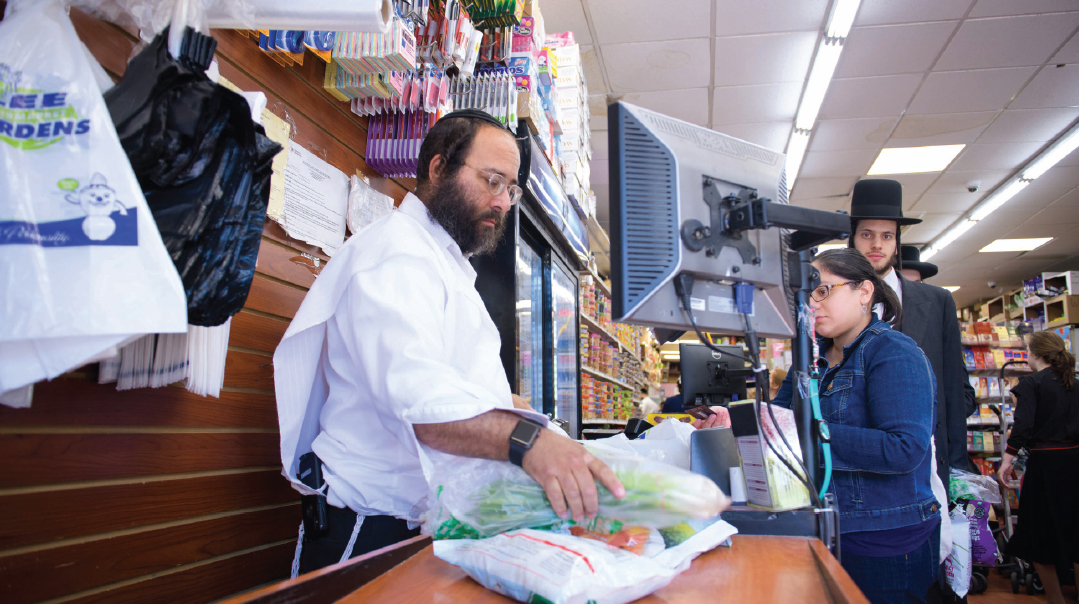
Williamsburg
Like a Personal Pantry — Lee Gardens Supermarket Est. 2002
By C.L. Hershkowitz | Photos: Naftoli Goldgrab
The sun has not yet risen as Williamsburg slowly awakens from its slumber. Men and teenaged boys hurry to shul for the early minyan. School buses rumble toward their first route of the day. Beyond the windows and doors of large, sprawling apartment buildings and four-family houses are the muted sounds of mothers and schoolchildren in various stages of wakefulness.
On Flushing Avenue, just off Lee Avenue, Menachem raises the iron shutters of Lee Gardens Supermarket. He unlocks the front door, turns off the alarm system, and starts setting up the grocery store for the day. He knows the drill by heart. The first customers of the day will undoubtedly be the high school girls grabbing bagels and chips as they rush to school. Next will come the working men and women fortifying themselves for their long day. By ten o’clock, the school buses will have finished their rounds, and mothers will troop in to fill up shopping wagons with produce, baking ingredients, and staples to fill their pantries. Tuesdays are relatively quiet; on Wednesdays the store is a madhouse; Thursdays are extremely busy; on Friday you cannot move an inch without jostling the scores of men and boys doing last-minute Shabbos shopping. And no matter the day of the week, as the clock inches closer to three o’clock, when the preschool buses return their precious cargo home, the frenzied rush by harried mothers racing to beat the clock intensifies.
Menachem may be the manager of the store, but Mr. H. Prero, an affable Klausenburger chassid in his forties, is the real force behind its success. He helped establish this grocery store 17 years ago, and is still running it with equal doses of professionalism and heart.
Until approximately 20 years ago, Williamsburg’s borders were sharply defined: Division Avenue to the west, Heyward Street to the east. Anything beyond those borders was either commercial/industrial, or home to minority groups, with the areas often unsafe and crime-ridden. As Williamsburg’s frum population experienced explosive growth, rezoning laws made the areas east of Heyward Street available for building. At first the frum community was hesitant to move beyond its comfort zone. But the first brave souls took their first tentative steps outside of its traditional borders, and soon enough others followed. As the neighborhood expanded, the need for additional infrastructure was clear. First on the list were new shuls and shtiblach, of course. A close second: food, what else?
Mr. Prero realized this was a perfect opportunity to start a grocery store. But it wasn’t easy. Customers at his small, shabby grocery store were few and far between. He held out, though, hoping the neighborhood would take off.
Then Wallabout Street — the street just around the corner — became a burgeoning shopping area, and more housing developments were built. Soon Lee Gardens Supermarket became the only grocery store in the area, and it became better established and equipped. More workers were hired, more items were kept in stock at all times. Today it’s a bustling business and neighborhood fixture. But what never changed is that mom-and-pop-shop feel — the relationship the Preros maintain with their customers.
While it’s officially known as the Lee Gardens Supermarket, this is no sleek, modern food emporium. The narrow aisles are crammed with everything from soup to nuts, and the store feels like one big family. I walk in on Wednesday afternoon, and the store is absolutely packed. Trying to count the number of strollers and double strollers parked around the checkout area, I soon lose count and give up. I rock one stroller, give a crying baby a pacifier, and signal to his mother — just one aisle away — that her baby is crying. As she walks over, I bump into Mrs. Prero, who is actively involved behind the scenes in running the store.
“Williamsburg shoppers are very different from those in other communities,” she says. “It’s a neighborhood full of balabustas from Hungarian backgrounds who love cooking and baking from scratch. Staples like flour, sugar, and eggs constantly fly off the shelves. On Wednesdays, judging from the shopping carts, everyone wants shredded cheese, tomato sauce, and pizza dough.”
Costco and Sam’s Club may be revolutionizing shopping for swathes of America, but here in Williamsburg, apartments are small, so people don’t shop in bulk. The neighborhood stores run on foot traffic. For many local families, Lee Gardens Supermarket almost functions like a personal pantry. During a busy season, like before Yom Tov, homemakers may suddenly find themselves missing a crucial ingredient, and will send over their children to pick up what’s missing. If the store doesn’t stock it, Mr. Prero will make sure to order it. If a busy balabusta doesn’t have anyone to send over, she’ll request a delivery — which the store staff gladly accommodates. And when someone’s trying out a new recipe with a product that the Preros don’t readily stock, they’ll do their best to source it and bring it in.
“Our customers are like our brothers and sisters,” Mrs. Prero says. “One of our customers wanted to start eating a healthier diet, and she asked me to guide her toward food staples to substitute for her regular fare. I helped her figure out how to overhaul her pantry. When someone makes a simchah, all of us know. We once reopened the store at the very last minute before Shabbos for a steady customer who just had a baby and needed food for the shalom zachar.”
Here at Lee Gardens Supermarket, it’s not unusual to see women in the aisles swapping recipes, or kids schmoozing about their favorite nosh. Come June, every school and yeshivah seems to have end-of-the-year trips, and the kids browse the aisles, deciding on their favorite snacks for the ubiquitous trip bags.
Trust is a given in this store. Like the mom-and-pop shops of old, the Preros will extend credit to their regular customers, trusting that they will pay up when their next paycheck comes in. Some customers don’t even shop in person: You can regularly find workers walking around with a sheet of paper, handpicking items off the shelf into a shopping cart, ringing them up, and then packing the order into a box to be delivered later. And many schools and shuls in the area call in phone orders of basic food staples, charging them to their accounts.
Just behind the large refrigerators housing the dairy products is the “secret” flight of stairs to the nerve center of the store. Tucked away a floor below is a nondescript office, where the phone is constantly ringing. The office secretary has the phone perpetually glued to her ear, where she patiently takes order after order, often waiting as the balabusta on the other end of the line methodically checks her pantries and refrigerator shelves for missing staples.
I’m done with my shopping and I head to the register to ring up my grocery order. It takes me a while to get there, though, because I run into a few friends and acquaintances, and we catch up on the happenings in our lives. There are a few people ahead of me in line — a nurse who works at a nearby medical office, a couple of hipsters who live in the trendy area two streets over, and a rebbishe einekel with a beketshe and dark hose. Everyone shops here — and everyone gets the same dedicated service.
Yoeli is manning the register. He is also fielding phone calls and making announcements over the loudspeaker. “Customer Schwartz, phone call.” Many families limit their children’s cell phone use, so if they have a last-minute addition to the child’s shopping list, they’ll call the store and have their child summoned to the phone. The Latino checkout guy in the next aisle isn’t sure of the price for a new product.
“Yoeli, cuantos?” he calls out. All around me is the hubbub of boxes being filled and stickers getting slapped on them. I’m done checking out.
“Any cases?” Yoeli asks. “Spring water? Soda?”
Not this time. I appreciate the reminder, though.
In any case, I know I’ll be back soon. In the age of rapidly burgeoning mega stores, there’s still nothing like shopping at a smaller establishment where they know who I am and what I need. And even if I forget one elusive ingredient, I don’t have to worry — with one phone call or e-mail, I’ll get it delivered later.
(Originally featured in Mishpacha, Issue 781)
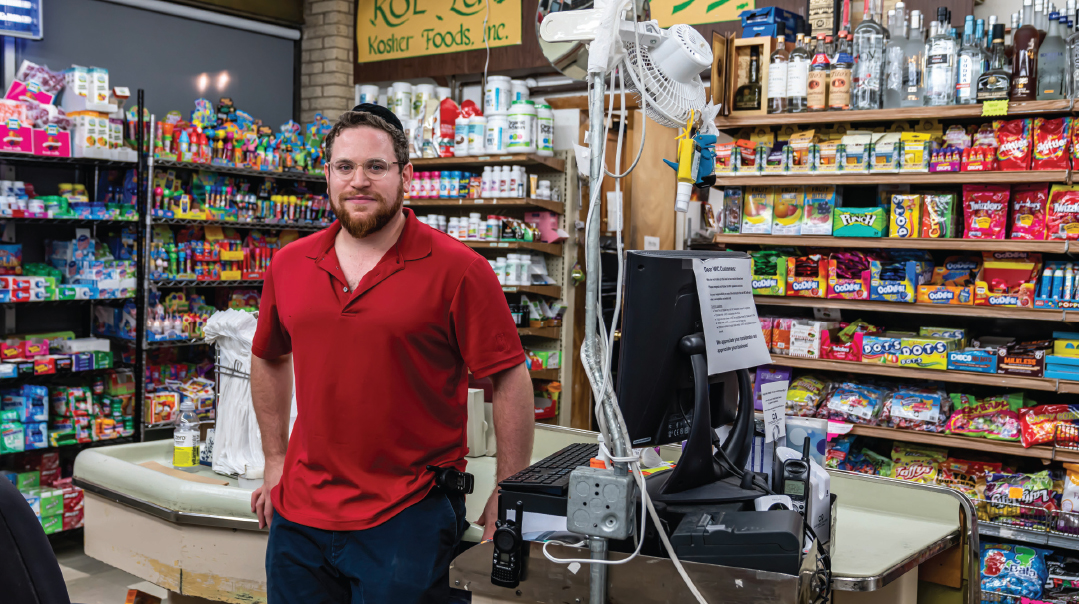
Chicago
Absolute Trust — Kol Tuv Est. 1987
By Beth Perkel | Photo: Raya Zigun Photography
Devon Avenue is a street in Chicago that literally spans land, sea, and air and links three of the city’s largest old Jewish neighborhoods. Stores have come and gone over time, gracing the avenue with smells of steaming cholent, fresh challah rolls, and at one point, even kosher Chinese food, but most of these aromatic delights have wafted away with time. A small heimishe grocery store smack in its center is one of the few vestiges remaining of the bustling Jewish life that once was Devon Avenue. From the outside, it is a rambling stretch of several storefronts pieced together over the course of three decades under a unifying blue awning bearing the simple, yet cheerful name of “Kol Tuv.”
Every inch of the store is crammed with products: Shabbos lamps peek out from the top of a refrigerator filled with deli, and bug-checking light boxes watch over the pickles. Bottles of Jack Daniels crown the hummus-and-dips fridge, and spelt flour and organic coconut milk powder somehow don’t seem like foreigners right around the corner from the candy bracelets and fizzy straws. Jewish music wafts in peppily from the stained ceiling boards.
The store space has grown over the years as neighboring storefronts were abandoned, and Kol Tuv annexed them to its empire of everything heimish.
Because the store did not reconfigure its space each time after adding another storefront, it’s more like walking from one room to another, unlike the vast open floor plans that prevail at larger retail chains. At one point, even a piece of the parking lot behind the store was appropriated for an enclosed structure that served as a warehouse. With these physical extensions came opportunities to add to the product offerings as well. Kol Tuv even brings in restaurant items, and while the featured restaurant offerings have changed over time, neighborhood residents can run in to get a Yemenite soup or fresh matbuchah, favorite items from a restaurant that’s a 20-minute drive away. Because of new city ordinances, parking at Kol Tuv is pretty scarce, so patrons are invited to park in the parking lot of a synagogue across the street.
Out in the aisles, Kol Tuv’s owner Rabbi Chayim Knobloch — a friendly, gray-haired man with smiling eyes — welcomes his customers by name. In fact, Rabbi Knobloch is a man on a mission — a mission he was sent on by the Zidichover Rebbe, Rav Yehoshua Eichenstein, almost 35 years ago today: to provide a heimishe grocery store environment with a full product line to the growing community of frum Jews in the Chicago metropolitan area, better known as Chicagoland. As Rabbi Knobloch rushes around to handle orders and juggle the needs of his customers, it is clear that this is a labor of love. In fact, he’s so focused on his customers’ needs that the lure of media attention didn’t really entice him any more than a local family’s order for prechecked romaine.
In a quieter moment, he can be found giving tours to local Jewish day school students who want to see what a kosher grocery store actually looks like, or on the phone with a contact in New York to track down an obscure item that one of his customers is hankering for.
I have firsthand experience with this myself. My husband once approached Rabbi Knobloch in the wee hours after the k’vasikin minyan down the block from the store to inquire whether there were any large boxes of “alef-beis” imprinted cookies still on the market for our precocious two-year-old tzaddik-in-training, who had already learned his English letters and was looking to up his literary game to Lashon Kodesh. Rabbi Knobloch told my husband apologetically that they were no longer anywhere to be found, only to somehow locate and place a box of the exact cookies in my husband’s makom later that week. When my husband approached him to thank and pay him, he accepted the former but refused the latter, saying it was an investment he was making in our son, a child he had never even met.
Rabbi Knobloch admits that 35 years ago, he knew nothing about business. He was a mechanech in a local elementary school when the Zidichover Rebbe approached him about buying an Israeli-run grocery store that was about to close. That store, call Mehadrin, might have been the size of a closet, but it was also the first store to bring heimishe products to Chicago — ones that most local residents had not yet seen. There had suddenly appeared certain pas Yisrael and chalav Yisrael products that the community had only dreamed of.
It wasn’t easy in the beginning, Rabbi Knobloch admits. “I used to know 99 percent of my customer base — people would come in, and if they didn’t have their checkbook with them or the money to pay right then, I had absolute inherent trust in everyone, and I didn’t even keep records of what they owed.”
Eventually, someone convinced Rabbi Knobloch to start writing things down. He tells of how he would “write it down on the back of a receipt that would then get blown away by a gust of wind.” The paper scraps evolved into loose-leaf, a system that later morphed into a series of spiral notebooks detailing thousands of dollars owed by customers.
While it’s hard to run a business on such trust, Rabbi Knobloch says he had a lot of siyata d’Shmaya.
“Sometimes tzaddikim would come to the store and anonymously ask to pay for other people’s accounts who they knew couldn’t afford it,” he says.
In fact, even the Chicago Tribune somehow heard about this business policy and featured a story about it. Rabbi Knobloch was delighted to see how far-reaching this kiddush Hashem was — he recounts how for the next few months, even non-Jews were sending in contributions to help settle the open accounts.
The tradition continues to this day within the community of frum Kol Tuv regulars. Rabbi Knobloch says that before Yom Tov, people still come in with money and “tell us to split it up however we see fit among the open accounts.”
Because of this trust, and the fact that he sees all kinds of people in the community whom others might not notice, he’s often given tzedakah money to distribute for non-related store matters.
Kol Tuv is a proud family-run business in the “mom and pop” store tradition. Two of Rabbi Knobloch’s children, Shulem and Chaya, are now instrumental in moving the business forward. He proudly describes how Shulem “has built up the wine business tremendously” and how that same son has also updated the checkout area “so that I don’t even know how to use the register anymore.”
Chaya is instrumental in arranging deliveries and logistics. People can e-mail or fax in an order, and the Kol Tuv workers will pull the items from the shelves and deliver them for free, as long as there is a minimum purchase and the home is in the area. However, for the elderly and homebound patients, no minimums apply — a sign hangs in full view announcing that for them, deliveries are free, with no minimum purchase.
The Eichenstein family, who were so instrumental in the store’s beginning, still shop and call in orders to the store, continuing their decades-long relationship with Rabbi Knobloch and Kol Tuv. Grandchildren of the original customers from back then come in these days; Rabbi Knobloch points to one mother and toddler and warmly exclaims to the mother, “I think I’ve known you since you were her age.”
Sometimes customers can be talking in the aisles for half an hour before finally making their way to the registers.
“It’s like a second home,” says shopper Sarah Chava Raiz. “We’ve been coming here for 20 years. Rabbi Knobloch is always walking around and making sure we’ve found what we need.”
Dora Reznik, who has been a Kol Tuv checker for ten years, says it’s a great place to work. “Rabbi Knobloch always makes an effort to hear what people want and to do the best for them. He likes to question every customer to know whether they found everything they were looking for, and if not, he makes it his business to try to order it.”
While the store has been an important part of the Jewish community for several decades, the area around Devon is definitely changing. With more Arabs moving in and street names changing to include secondary names like “Honorary Sheikh Mujib Way” and “Mohammed Ali Jinnah Way,” some locals are concerned. Rabbi Knobloch mentions how a community member who was concerned about the physical safety of the store amid the changing community encouraged him to put up metal grates on the windows for protection during after-hours. Rabbi Knobloch decided not to do it, saying he felt it would be a “potch to the neighborhood.” He believed that the store wouldn’t be harmed, and so far, the neighbors have abided his trust.
“B’chasdei Hashem, we’re still in business. In today’s economy, it’s not so simple, but we’re grateful that we still have something unique to offer.”
(Orignally featured in Mishpacha, Issue 781)
Oops! We could not locate your form.






